This year, EagleMUNC V hosted around 585 delegates from 40 different high schools and MUN clubs from within the US and abroad this past weekend of March 17-19, 2017. The conference’s theme was “The Interplay of Power and Ethics.“ Under this motif, EagleMUNC delegates experienced a wide range of both classic General Assembly-style and integrated crisis committees, including a completely immersive British Parliament experience, the Mexican-American War joint crisis committees, and the clash of interests between the Wall Street Executive Board and the Federal Open Market Committee (FOMC).
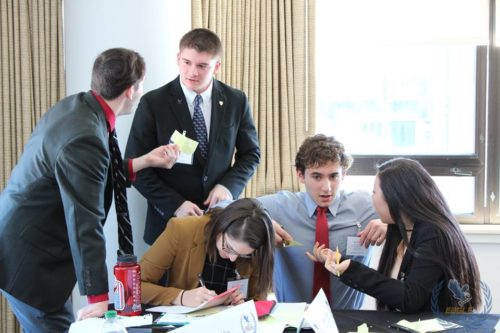
Delegates working tirelessly in committee
Keeping with its theme, EagleMUNC V presented unique simulations in accordance with its mission of educating through experiential learning, forward thought, and innovation. The 2017 Keynote Speaker, FBI Special Agent Jeffrey Wood, was a US Army Infantry officer who went on to spend the majority of his career working with violent street gangs. He has been around the world on counterterrorist assignments, won the FBI’s Meritorious Medal for Bravery, and illustrated to those in attendance how tricky it is to discern the line between right and wrong during his speech, especially when one has the ability to abuse his or her power.
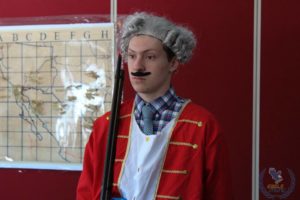
A crisis staff member is suited up for action
Each of the 17 different committees was designed to expose students to the myriad of applications for political debate and negotiation, giving special attention to the educational value instilled upon the delegates. In order to do so, the Political Affairs Department, which is entrusted with providing the content for each simulation, pre-builds what the conference calls “ideal paths” to stay ahead of the curve and triple the amount of articles and updates ready when the delegates arrive. This forward-thinking procedure allows EagleMUNC to focus more on providing an innovative product rather than being bogged-down with logistics—hyper-realistic procedures in place such as the rules of procedure in Parliament, rotating voting banks in FOMC, and the sub-committee, Federation resolutions in FIFA showcase this approach at play. Moreover, each committee was given a budget for materials and props, surprising delegates with a Battleship-meets-Risk grid map for troops movements in the Mexican-American War JCC, a Virtual Reality simulation in the UNHCR committee, and a fully-robed Parliament Speaker.
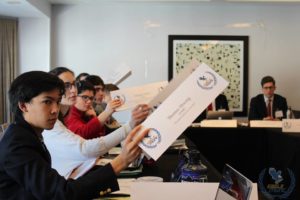
Delegates hard at work in the FOMC committee.
This year, the conference also introduced the Lobby Corps committee for the first time, allowing delegates the opportunity to sway policy-making in other committees by using their own personal budgets, often with the intent of creating a Utopian society. These delegates began by drafting an agenda outlining the goals for The Society, an organization which hoped to create an ideal world in its image by utilizing their finances, influence, and power to effect change. Throughout the weekend, lobbyist visited their assigned committees to convince delegates to work with them utilizing a “candy-bribe system,” which featured lollipops and Jolly Ranchers as a tangible representation for their monetary bribes. Delegates, in another instance of hyper-realistic procedure, were able to utilize their budgets to “purchase” crisis events in order to sway debate in other committees. They concluded by presenting their finding to the committee as a whole and analyze how successfully they affected policy in various committees.
In hopes of fully immersing our delegates in our 40-Hour Simulation, this committee, as well as the Wall Street JCC, had full access to technology. In both of these committees, all communication between delegates and the crisis room was facilitated through provided EagleMUNC-specific emails. The immersive nature of the committee led to the creation of character Twitter accounts and debate on social media. This JCC followed the timeline of the financial crisis of 2008, introducing different year-specific events in different committees, culminating in 2017 during the Sunday session. Furthermore, in addition to the ever-present midnight crises, the conference introduced “lunch-time” ones, where delegates were either held late to solve a surprise problem, or were given a task to resolve during the break in-between session that would be crucial for future success in the committee—in example, delegates in the Mexican-American War JCC were given a coded message to decipher.
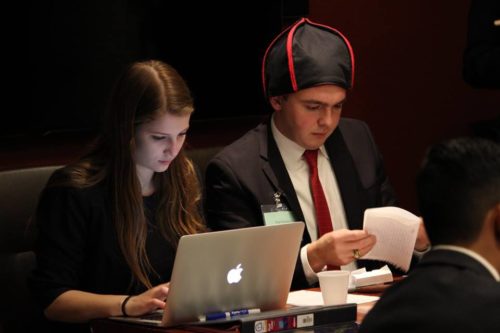
Chairs of the Ad-Hoc Genghis Khan committee
Elsewhere, members of the Ad-Hoc Genghis Khan Committee drafted their own version of the Mongol sacred law to govern both their people and those they conquered in Asia. The CoP 21 summit managed to collaborate to form three resolutions, two of which passed, which dealt with measures of mitigation and adaption and including allowances of tiered capabilities between developed and less developed countries. Delegates grappled with both moral dilemmas and practical questions as they moved toward addressing the mounting climate change fears worldwide and building capacity on individual and structural levels. The ICRC and UNHCR addressed the grave humanitarian issues in place in various places around the world, namely North Africa and the Middle East. The European Union faced the challenging nationalistic trends sweeping throughout the continent in the wake of continuous terrorist attacks, as well as the possible scenarios of what a post-Brexit world will look like. Lastly, once more we brought back the popular “planted delegate” tactic in various committees (a Boston College student disguised as a delegate), which provided a twist to the in-committee experience.
Our EagleMUNC app was designed to enhance the advisor and delegate experience at our conference. This resource is free and accessible on the App Store. If interested, visit https://itunes.apple.com/us/app/eaglemunc/id1089794313?mt=8. In addition, the EagleMUNC Snapchat account recorded all the exciting action throughout the weekend in our story. Delegates and EagleMUNC team members were encouraged to “snap” at the EagleMUNC account and used the two customized EagleMUNC geofilters throughout the weekend.
The delegation awards are listed below:
Best Large Delegation: St. Ignatius College Prep (IL)
Best Small Delegation: Darien High School (CT)
Outstanding Large Delegation: Stuyvesant High School (NY)
Outstanding Small Delegation: Cape Elizabeth High School (ME)
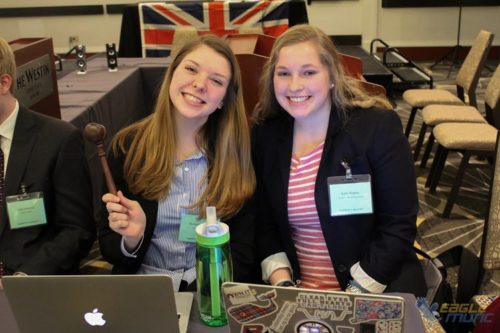
Chairs of the Wall Street JCC
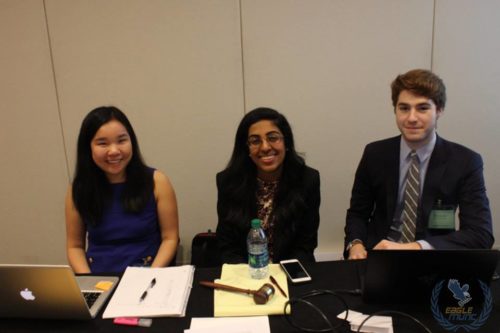
Delegates in the UN Women committee
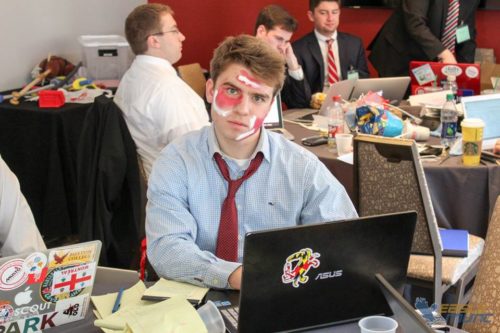
A crisis director gets into the spirit of Model UN!


